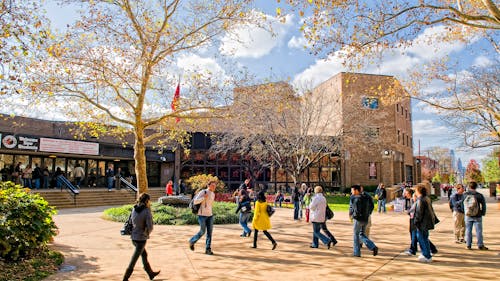Underpaid for years compared to New Brunswick, Newark campuses, Camden professors say

Several Rutgers—Camden professors said they are paid significantly less than their counterparts at Rutgers—New Brunswick and Rutgers—Newark, pointing to a persistent pattern of pay inequity at the Camden campus, according to The Philadelphia Inquirer.
Ellen Ledoux, an associate professor in the English and Communication Department at Rutgers—Camden, said she began petitioning for fair pay in March 2020 when she realized that her New Brunswick and Newark counterparts who were equally or less qualified than her earned approximately $30,000 more.
Ledoux's petition is part of the greater salary equity program, a contract between the University and the Rutgers American Association of University Professors and American Federation of Teachers (AAUP-AFT) from 2018 to 2022.
"I really realized, 'Wow, I've been, this whole time, just keeping my head down and not complaining,'" she said. "And then I realized, 'Wow, everybody else is being paid way more than I am for the same work.' And so that really upset me."
In September 2020, Howard Marchitello, the dean of the Faculty of Arts and Sciences at Rutgers—Camden, wrote to University compensation services in support of increasing Ledoux's salary.
Ledoux said compensation services offered her a $781 increase, which she appealed. In her second appeal, she reached out to Rutgers—Camden Chancellor Antonio Tillis, and he responded by agreeing with the compensation services' suggestion without providing a justification for it, she said.
"There was a whole bunch of us who just got our remand, just restated to us from the chancellor, like he didn't even look at the difference in anybody's salaries," Ledoux said.
She said that when faculty are underpaid, they have little incentive to participate in unpaid work, such as providing students with opportunities for independent study and mentoring.
Ledoux said that her colleagues at the New Brunswick and Newark campuses seem to be in solidarity with those at the Camden campus, according to union communications. Additionally, she said she welcomes student support for the cause, though she recognizes their busy schedules and extracurricular responsibilities.
She said she wants the University administration to explain her current salary and provide an increase that would make her salary comparable to her counterparts at the New Brunswick and Newark campuses.
Daniel Shain, a professor in the Department of Biology at Rutgers—Camden, said he believes the campus pay gap has cost him approximately $20,000 annually over the past 20 years of his professorship.
He said that some faculty members are filing grievances with the AAUP-AFT, which itself is preparing to file a lawsuit against the University's salary equity program.
With the salary equity program, the University uses comparators, or a professor's peers, based on factors such as length at the University, departmental rank and research productivity as part of its process in conducting inter-campus salary evaluations, Shain said.
He said that the two main problems with peer equivalency are disagreement on who qualifies as a professor's peers and perception undermining Rutgers—Camden as the smallest campus.
"People on either side of the equity line are not comfortable," Shain said. "If you're underneath, and some of your peer equivalents (are) making more than you, you're not very happy. If your peer equivalent is making lower than you, then you're not comfortable either. It just creates this unnecessary imbalance and tension."
Shain said that while the outcome of the faculty strike during the previous academic year raised salaries for professors, the pay differential at Camden remained.
The AAUP-AFT did call for equitable pay for equitable work across University campuses in its opening bargaining demands with the University administration. It also cited this demand as a win in its bargaining highlights.
Ledoux added that the strike itself, while positive, increased the cross-campus discrepancy due to the percentage-based aspect of the salary increase.
Regarding University President Jonathan Holloway's statements about Camden as a lower classified research activity institution than New Brunswick in response to pay inequity concerns, Shain said that such classifications are not representative of individual professors at the Camden campus who exceed the performance of their counterparts at New Brunswick.
Shain also noted that the unspecified dismissal of Marchitello as dean in tandem with Ledoux's petition with compensation services caused a greater feeling of distrust and disappointment in Camden leadership among faculty and led to a vote of no confidence.
Overall, Shain said that the ideal system of faculty wages and benefits he seeks would determine salaries on the same set of criteria across New Brunswick, Newark and Camden.
In a statement to The Daily Targum, the University said that approximately two-thirds of Camden faculty who requested evaluations under the salary equity program received adjustments to their salaries, and the process includes an independent committee and faculty experts for all evaluation and feedback given.
"We're supposed to be one big 'R,' right? One big, happy family, as President Holloway likes to talk about, 'our beloved community,'" Ledoux said. "In order to have that beloved community, there has to be equity among the campuses."
Editor's Note: This article was updated to clarify former Dean Howard Marchitello's dismissal and its relation to Ellen Ledoux's petition.



